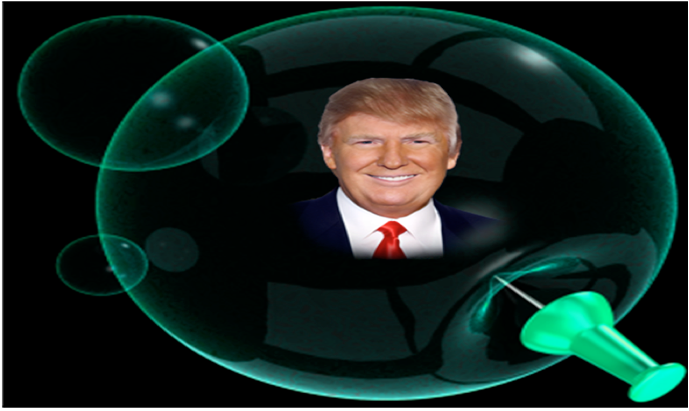CommentsGELFAND’S WORLD--What will international relations be like with Donald Trump, the self-proclaimed master negotiator? Will the United States really get wonderfully advantageous new trade agreements? Will our currently negative trade balance reverse itself?
Let's start with this simple fact. Every other major country has watched and listened to Trump during his presidential run. They all have a file on him. They have catalogued his personal and business history, his level of understanding of technical matters, and his personal relationships. They have psychological profiles and estimates of his trustworthiness. By now, they have studied his negotiating style and importantly, how deals he made turned out for each side.
Out of all of these data points, one thing stands out. Trump has a tendency to renege on his obligations, often at the last moment. His record of unpaid bills became a part of the campaign narrative. Unless the rest of the world's trade ministers are total suckers, they will have noticed.
If you were a trade negotiator in Mexico, China, or Korea, what would you be thinking right now? If I were in that position, my first thought would be, "What used to be a trade negotiation will now be a battle to the death. Trump will be looking for scalps to hang on his belt. I don't want to be the one to be his first victim."
At a more rational level, what foreign trade negotiator would enter into an agreement if there is no reason to believe that the other side (that's us) will keep its word? After all, Trump breaks his word. That's his style. He bragged about it during the campaign.
What is the rational strategy to adopt when dealing with the untrustworthy?
About three decades ago, Herb Cohen authored You can negotiate anything. It was a precursor to scads of self-help books and pop-management books. In the book, he described a negotiating method used by the Soviet Union in purchasing property in this country. The Russians created lots of difficulties early on and dragged things out in order to exhaust the seller. Then, as completion of the deal seemed to approach, the Russians demanded a whole new set of substantial concessions. Cohen dubbed this the Soviet style of negotiation, and recommended avoiding involvement with those who practice it.
Trump has his own style, but it isn't any better. He likes to make wild claims, but somehow fails to pay what he owes when the bill comes due. True, this was in the private sector, but it's an indication of personal character. This isn't appropriate to international trade deals which depend on both parties acting in good faith.
Negotiating a trade deal is typically a laborious process, often taking years. The agreements can encompass thousands of products, processes, and legalistic details. There is no point in getting into such a negotiation unless you believe that each day's work leads to something productive. The likelihood that you will be faced with a whole new round of hurdles right at the end of the negotiation would be a spoiler. Countries which can afford to negotiate from a position of strength (those are the ones we want a better deal from) will avoid such scenarios.
Therefore, one rational strategy for dealing with the Trump administration is to avoid any new negotiations. There is no point in upending current relationships, and Trump will be gone in less than a decade, maybe much less. The prediction therefore is that foreign countries, faced with offers to negotiate, will find excuses to stall. It will be "thanks, but no thanks. I'm washing my hair this year."
The problem, you see, will arise when Trump explains confidentially, "Don't take what I said during the campaign seriously. I really mean this, and I will negotiate in good faith." Reporters refer to this maneuver as the pivot, but it will be unconvincing to any nation which is keeping a file on Trump.
And they are all keeping a file on Trump.
The Bubble
American presidents gradually lose contact with the American people because they are of necessity kept in a bubble. Access is limited not only to assure personal safety but also for political reasons. Trump seems to have made his own bubble during the campaign. Stories he didn't like were tweeted out of existence.
We might have expected him to tone down the reactivity after the election -- you know, engage in the pivot we were told to expect. One recent Trump action suggests otherwise. When confronted with the fact that he finished second in the popular vote by more than two million votes, he went right back into denial, claiming a grand and glorious win. If it hadn't been for illegal votes, he argued, he would have won the popular vote easily. This is of concern because it shows that Trump has not abandoned his propensity to lie when it provides him some political advantage.
But presidents have the ability to appoint cabinet officers and advisers who can keep them aware of reality. It's not obvious that Trump is doing any such thing. The cabinet picks and security adviser he has chosen look to be precisely the opposite. There does not appear to be anyone in his close circle to tell him that global warming is a fact, that Putin is aggressive, or that vaccination saves lives. Needless to say, there doesn't appear to be anyone to tell him that cutting taxes on the ultra-wealthy is a bad plan, and not the recipe for economic expansion.
(Bob Gelfand writes on science, culture, and politics for City Watch. He can be reached at [email protected])
-cw
Sidebar
Our mission is to promote and facilitate civic engagement and neighborhood empowerment, and to hold area government and its politicians accountable.

 CityWatch Los Angeles
Politics. Perspective. Participation.
CityWatch Los Angeles
Politics. Perspective. Participation.
04
Wed, Mar














